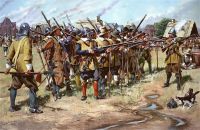ARLINGTON, Va., Dec. 12, 2011 — The origin of the nation’s state National Guard organizations sprang from the forming of militia in the Massachusetts Bay Colony in the early 17th century.
The Massachusetts colony was founded in 1630. At that time, more than 5,000 men, women, and children had made the two-month voyage to the New World, leaving the relative comfort and safety of England behind in an effort to break free of religious intolerance, and to manage their communities the way they saw fit.
In doing so, their actions tread new ground in the country that would become the United States of America.
The military organization we know today as the National Guard came into existence with a direct declaration on Dec. 13, 1636 when the Massachusetts General Court in Salem established that all able-bodied men between the ages of 16 and 60 were required to join the militia.
The North, South, and East Regiments were established with this order. The decree, which excluded ministers and judges, stated that citizen-soldiers who mustered for military training could be and would be called upon to defend the colony when needed.
Owing to many failures in the time that English settlers had attempted colonization in the Massachusetts frontier and elsewhere in North America, leaders decided that a proactive and ready state of mind must be kept by all citizens, particularly those training in military tactics. Being part of citizenry in small villages meant that a price must be paid for the freedoms that could potentially be enjoyed, were the colony to ultimately succeed. That price meant taking responsibility for defending the settlements of the Massachusetts colony.
The outposts were austere, and the colony relied upon male pioneers to provide food, shelter, and defensive protection. Even with all available hands working, this was difficult. Worse, the nearby Pequot Indian tribe proved a restless and unpredictable neighbor, leaving the Massachusetts colonists vulnerable to guerilla-style attacks that could decimate the fledgling settlements. In an environment rife with disease, poor sanitation, and harsh weather conditions, all able-bodied members of the Massachusetts colony pulled together out of necessity.
Self-sufficiency proved instrumental. In the New World, hiring mercenary fighters in the European tradition to ward off Indian attacks would be impossible. For one thing, the colonists had no money. Other foreign interests in the New World such as the French and Spanish, even if they were available for defensive purposes, did not share English views on religion and political matters. They would have seriously undermined the stability of the Massachusetts colony. Governing and policing the settlement would have to be left to the colonists themselves.
The militia system of self defense proved successful. Soon after the militia was established in Massachusetts, the entire New England region defended itself against the aggression of the Pequot nation. Other colonies such as Connecticut and Rhode Island mustered militia units, and succeeded in forcing the Pequots to capitulate in 1638. Ultimately, the militia enlisted from the many small villages proved a strong component in building confidence for the settlement as a whole.
Other colonial settlements in North America such as those in Florida, Virginia, and New Mexico utilized military protection to allow settlers safe passage and defend against aggressors, but Massachusetts proved to be the first to have its government establish and raise a militia of continuous service. That legal precedent and record of service has remained continuous and unbroken, no matter the change in each unit’s function as a part of the militia or National Guard.
This distinction qualifies it as the birthplace of the militia in the United States. With the North, South, and East Regiments established, its exemplary military tradition continues through this day with four Massachusetts National Guard units — the 101st Engineer Battalion, the 101st Field Artillery, the 181st Infantry Regiment, and the 182nd Infantry Regiment.
Today, Massachusetts’ population numbers 6.5 million people, and the commonwealth figures prominently as a center of manufacturing, electronics/technology, and finance. Much has changed since 1636, but one thing has not: the National Guard still consists of citizen-soldiers and airmen providing assistance during natural disasters, training regularly to uphold high standards of readiness, and deploying to far-away countries to protect the United States’ national interests.
Although America’s growth and expansion has made it a large military force around the world, the National Guard remains a community cornerstone — just as it did when it was born on Dec. 13, 1636.
Source:
U.S. Department of Defense
Office of the Assistant Secretary of Defense (Public Affairs)

 von
von 